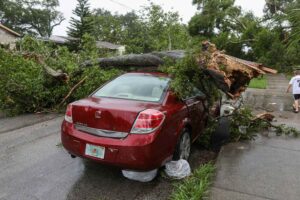
Car insurance is a necessary expense for any driver, but have you ever wondered how your claims history affects your insurance rates? Whether you’ve been in a minor fender bender or a major accident, your claims can have a significant impact on your car insurance premiums.
In this article, we’ll explore how claims impact car insurance rates and what you can do to keep your rates as low as possible.
What Are Car Insurance Claims?
Before we dive into how claims affect your rates, let’s first define what a car insurance claim is. A claim is a request made to your insurance company for financial compensation for damages or injuries sustained in a car accident.
There are two types of claims: Not At-Fault and At-Fault. A Not At-Fault claim is when you are involved in an accident that is not your fault, and your insurance company pays for the damages. An At-Fault claim is when you are responsible for the accident, and your insurance company pays for the damages.
How Claims Impact Car Insurance Rates
At-Fault Claims
If you are involved in an At-Fault accident, your insurance rates are likely to increase. This is because insurance companies view At-Fault claims as a sign of risk. If you are responsible for an accident, it is an indication that you may be more likely to cause another accident in the future.
Severe accidents can also impact your premium. If the accident resulted in significant damages or injuries, your rates may increase even more. This is because the insurance company will have to pay out a larger sum of money, and they will want to recoup those costs through higher premiums.
Not At-Fault Claims
Not At-Fault claims typically do not have as significant of an impact on your auto insurance rates as At-Fault claims. However, they can still cause your rates to increase. This is because insurance companies view multiple claims, regardless of fault, as a sign of risk.
For example, if you have been involved in multiple Not At-Fault accidents, the insurance company may see you as an unlucky driver or someone who is more likely to be involved in future accidents. As a result, they may increase your rates to offset the potential risk.
Other Car Insurance Rate Factors
While claims are a significant factor in determining car insurance rates, they are not the only factor. Other factors that can impact your rates include:
- Driving record: Your driving record is a reflection of your driving habits and history. If you have a history of speeding tickets, traffic violations, or accidents, your rates are likely to be higher.
- Age: Younger drivers are typically seen as riskier to insure, so they often have higher insurance rates.
- Location: Where you live can also impact your rates. If you live in an area with a high number of accidents or car thefts, your rates may be higher.
- Vehicle type: The type of car you drive can also affect your rates. Cars with higher safety ratings and lower repair costs are typically cheaper to insure.
- Credit score: In some states, your credit score can also impact your car insurance rates. Insurance companies view individuals with higher credit scores as more responsible and less likely to file claims.
Tips to Keep Your Car Insurance Rates Low
While you may not be able to control all the factors that impact your car insurance rates, there are steps you can take to keep your rates as low as possible.
Drive Safely
The best way to keep your car insurance rates low is to drive safely. Avoid speeding, follow traffic laws, and practice defensive driving techniques. By being a responsible driver, you can reduce your risk of being involved in an accident and filing a claim.
Possibly Raise Your Deductible
Your deductible is the amount you pay out of pocket before your insurance company covers the rest of the costs. As you raise your deductible, your monthly premiums decrease. Just be sure to choose a deductible that you can afford to pay in the event of an accident.
Bundle Your Policies
Many insurance companies offer discounts for bundling multiple policies, such as car and home insurance. By bundling your policies, you can save money on your car insurance rates.
Shop Around
Don’t be afraid to shop around for auto insurance quotes. Different insurance companies may offer different rates, so it’s worth comparing quotes from multiple providers. Just be sure to compare the same coverage levels to get an accurate comparison.
Take Advantage of Discounts
Insurance companies offer a variety of discounts that can help lower your rates. These may include discounts for safe driving, good grades (for students), or being a member of certain organizations. Be sure to ask your insurance provider about any potential discounts you may be eligible for.
What to Do After an Accident
If you are involved in an accident, it’s essential to take the right steps to protect yourself and your insurance rates.
- Stay calm and assess the situation. Call for medical assistance immediately if anyone is injured.
- Contact the police and file a report, even if the accident appears to be minor.
- Exchange information with the other driver(s) involved, including names, contact information, and insurance details.
- Take photos of the accident scene and any damages to your vehicle.
- Contact your insurance company and file a claim as soon as possible.
Conclusion
In conclusion, claims can have a significant impact on your car insurance rates. Whether you are involved in an At-Fault or Not At-Fault accident, your rates are likely to increase. However, by driving safely, choosing a higher deductible, and taking advantage of discounts, you can keep your rates as low as possible. In the event of an accident, be sure to follow the proper steps to protect yourself and your insurance rates.
If you have any questions regarding auto, home and business insurance options, please contact us, we’re always glad to help. The NY Insurance Hub serves Albany, Schenectady, Troy, Latham, Cohoes, Watervliet, Clifton Park, Saratoga Springs, surrounding Capital Region areas and all of New York State from NYC to Buffalo.

